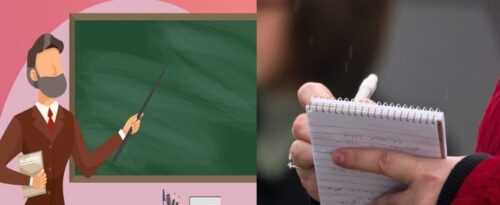The Professors and the Journalists
 Moderator Jonathan Alter explained that this panel would explore the relationship between being both a journalist and biographer and the relationship between professional scholars and journalists (a relationship Alter thinks is getting better).
Moderator Jonathan Alter explained that this panel would explore the relationship between being both a journalist and biographer and the relationship between professional scholars and journalists (a relationship Alter thinks is getting better).
In his introductory remarks, Paul Hendrickson called himself “an old shoe-leather reporter,” though he has experience teaching nonfiction at the college level. His books include Hemingway’s Boat: Everything He Loved in Life and Lost and Plagued by Fire: The Dreams and Furies of Frank Lloyd Wright. Leo Damrosch painted himself as the outlier in the group, since he is a lifelong academic with no experience in journalism. His biographies include The Club: Johnson, Boswell, and the Friends Who Shaped an Age and a study of Jonathan Swift. Susan Glasser, a staff reporter at The New Yorker, said she felt like something of an interloper, too, as she has written just one traditional biography, The Man Who Ran Washington: The Life and Times of James A. Baker III, though her book on the Kremlin contained biographical details of Vladimir Putin. (Glasser coauthored both books with her journalist-husband, New York Times White House correspondent Peter Baker.)
Damrosch said he turned away from literary criticism to biography “as a way of talking about human lives,” though he thinks the journalists working on biographies of contemporary figures have an advantage over a biographer like him who, so far, has focused on an 18th-century subject. “All I have is documents” to work from, he said, but from them his goal is to “tease out a plausible story from uneven evidence.” The latter can include authors of documents who have an axe to grind, so his challenge is to get behind that bias to determine what really happened.
Glasser explained that she and her husband were fortunate that Secretary Baker was “extremely generous with his time” when it came to interviews. But the interviews did not reveal the whole of the subject, so they also relied on a ready supply of archival information available at Princeton and Rice universities. Glasser said the book took seven years to research and write, as the project was “derailed by the Trump era”—a reference to her and Peter Baker’s need to continue with their journalistic day jobs while working on the Baker book. But in a way, she said, working on both things at once was a benefit, as their research on how Washington, D.C., operated in a different era informed their reporting on Washington today. Glasser said they pressed Baker “again and again about Trump” and his reaction to the president. “You have to listen to your subject. . . . He could find Donald Trump nuts and crazy and vote for him twice. That was very interesting to us.”
Hendrickson also uses a combination of interviews and archival research for his books. He said, “Your goal is to get into the archives, but your goal in a sense is to fight your way out of the archives.” He quoted longtime Washington Post sports editor Shirley Povich as saying “if you go, it will happen,” meaning there is “some mysterious combination” of both interviewing and exploring documents in the archives that is necessary for a successful biography.
Looking at the people the other panelists profiled, Damrosch noted that Alter and the other two panelists “are swimming in the same ocean as your subjects.” In his work, he explained, he is “not living in [his subject’s] culture,” so he has to recreate it for the reader.
Alter, the author most recently of His Very Best: Jimmy Carter, a Life, said that as a biographer, he might do some things that he wouldn’t do as a journalist, such as let an interviewee review quotes or present questions in advance. He also questioned taking a tack that drifts too far from the standards of the genre. His example was Edmund Morris, best known for his three-volume biography of Theodore Roosevelt. Alter called Morris “a tragic figure” who “took two wrong turns.” The first was creating a fictional character named Morris and inserting him into his Dutch: A Memoir of Ronald Reagan, complete with made-up endnotes. The second was writing a biography of Edison in reverse chronological order. Morris, he said, “messed with” one of the organizing structures that makes biography slightly easier to write than other nonfiction genres—the chronological order of the subject’s life.
Alter noted that Morris, who died in 2019, could not be there to defend himself, but he read a defense of him submitted by Kai Bird, who was attending the panel. Bird thought Morris’s book on Reagan is “the best thing we have on Reagan,” as the fictional character let Morris speculate about the former president. (Though Bird admitted later that creating a fictional “Morris” was a mistake.) Alter said that while the book does have deep insights, “all you ultimately have in a biographer is trust. If you can’t trust what he is writing happened . . . the whole edifice crumbles.”